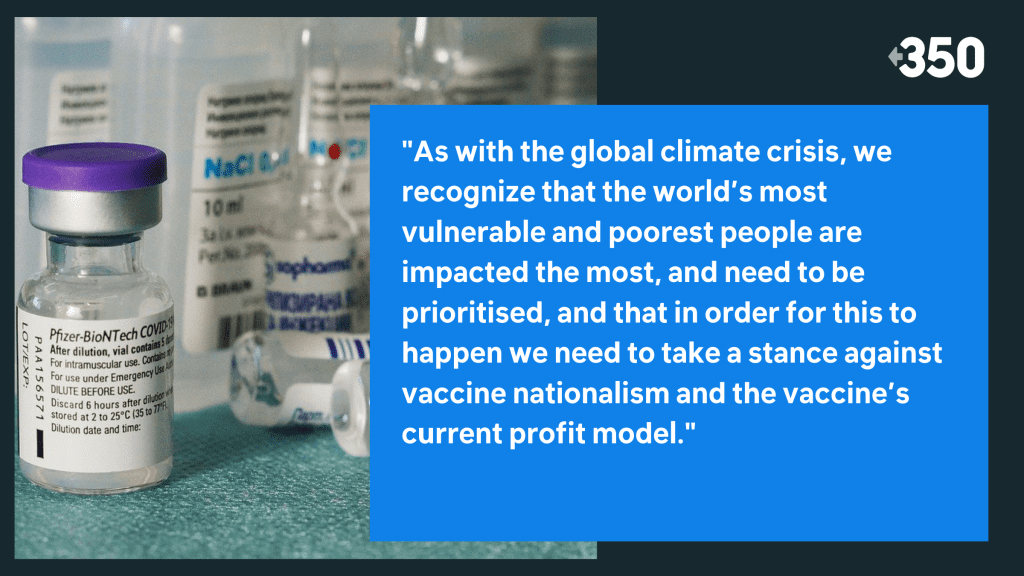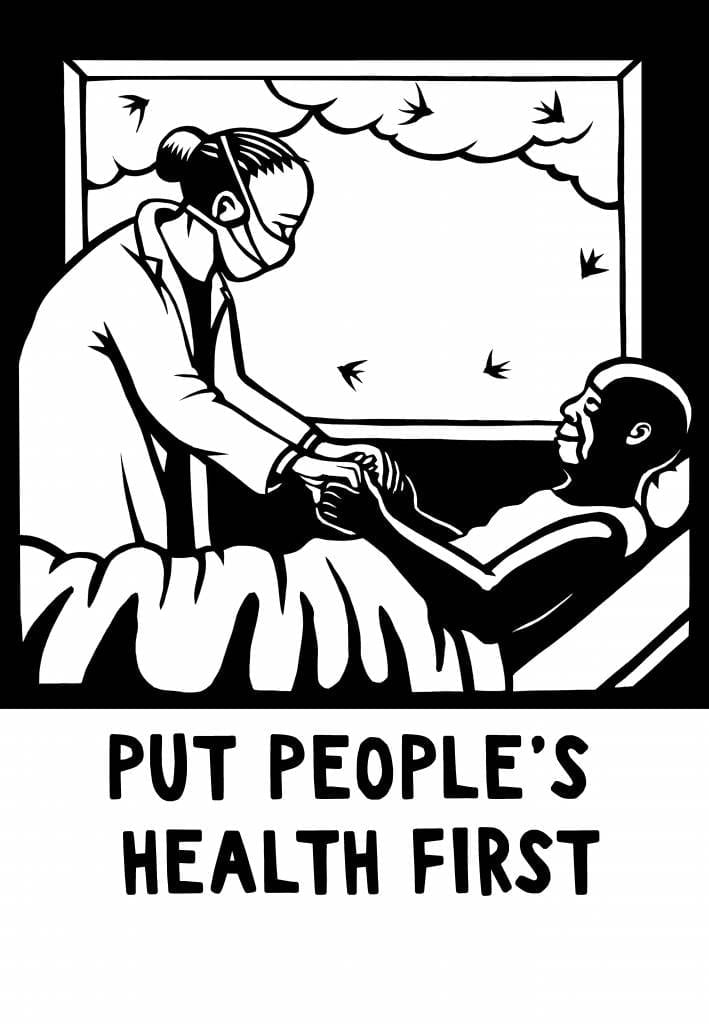Since the onset of the global COVID-19 health pandemic, 350.org has been calling for a Just Recovery for all. The first of the five Just Recovery principles is ‘Put people’s health first, no exceptions’. A year on, we are witnessing what the World Health Organization (WHO) is calling a ‘shocking imbalance in the global distribution of vaccines’ between rich and poor countries – and between rich and poor citizens within countries. With the current deep inequities in vaccine access, it may take several years for the world’s most populous and vulnerable countries to immunize their populations.
One crucial step that can be taken is to waive all vaccine patents, so we can boost the production and distribution of vaccines. It was heartening to see U.S. President Biden show some support for this, but we need more nations to take a stand.

Do we prioritize the lives of people all over the world? Or do we prioritize the profits of select corporations? It’s time for leaders of industrialized nations to make the right decision.
Wealthy nations caring about the lived realities of others is a fundamental issue for climate justice and vaccine access. The for-profit vaccine model will ensure that the poorest, most vulnerable people are vaccinated last. Aside from the inequity on a global scale that models climate impacts, vaccine inequality is directly impacting the global climate movement’s ability to take action: for example, people from many parts of the world will be unable to participate in UN Climate Change Conference (COP26), which has resulted in some groups calling for its postponement. We simply cannot create impactful climate solutions without the most impacted at the front and centre of negotiations.
For many people, this could feel like an impossible choice either way: support climate negotiations without the participation of the most marginalized and impacted communities, or delay climate negotiations another year.
The end of the pandemic and its impact is not in sight. With the current vaccination model operating at the current rate, this cycle of inequality will continue as the virus mutates: the resources to deal with the vaccine are hoarded, distribution is slow, and the virus will spread. This is a framework of global action that cannot be tolerated.
With vaccine patents and a for-profit model, the current cost of COVID-19 vaccines is also absorbing vast amounts of money that is needed on the climate crisis, particularly in poor countries. Until there’s a vaccine without a patent, we will face an ongoing cycle of inequality as the virus mutates.
In India, we are already seeing the hugely saddening impacts of this for profit vaccine model, and indeed of other pharmaceuticals as life-saving drugs are being bid over. But we are also seeing a lot of communities mobilize to distribute oxygen to people, for example via temples. Similarly to the climate crisis, when global leadership fails – local communities organize.
The burden of responsibility however must sit with world leaders collectively, on both COVID-19 and climate: both global crises require a global response to solutions. We need more than handouts and donations from industrialized nations – we need justice. Responding to calls from India and South Africa, the Biden Administration has come out in support of waiving vaccine patent protection.
The COVAX scheme, led by the WHO, aims to redress the imbalance in vaccine distribution – looking to deliver over 2 billion doses of the vaccine to 190 countries in less than a year. However, at least 70% of the global population needs to have immunity to end the pandemic, and this project falls short of reaching that level. In fact, proceeding at the target rate of two billion doses per year means it could take several years to vaccinate 70% of the world’s estimated 7.8 billion people, by which time we may well need to deploy new vaccines for new strains of the virus.
350.org believes that a Just Recovery from COVID-19 means putting people’s health first, no exceptions. As with the global climate crisis, we recognize that the world’s most vulnerable and poorest people are impacted the most, and need to be prioritised. In order for this to happen we need to take a stance against vaccine nationalism and the vaccine’s current profit model, publicly pushing for a global approach to solving a global issue.

art work by Paperhands